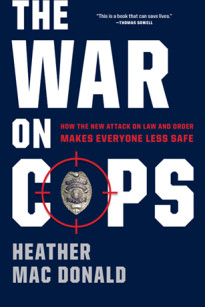I n the Wall Street Journal, Heather Mac Donald explores how the rise in anti-police animus has led cops to retreat from pro-active policing strategies—and opened the door to Chicago’s bloody crime wave. Mac Donald describes this phenomenon as the “Ferguson effect.”
Since the shooting of Michael Brown in Ferguson, Mo., in August 2014, the conceit that American policing is lethally racist has dominated media and political discourse, from the White House on down. Cops in minority neighborhoods in Chicago and other cities have responded by backing away from pedestrian stops and public-order policing; criminals are flourishing in the vacuum.
The Chicago Police Department’s appalling handling of Laquan McDonald’s unjust police homicide has only buttressed the Black Lives Matter movement’s anti-cop narrative—and encouraged resistance towards the police in the line of duty. “People are a hundred times more likely to resist arrest,” a South Side cop told Mac Donald. “I haven’t seen this kind of hatred towards the police in my career.”
“Police stops dropped nearly 90% in the first quarter of 2016,” explains Mac Donald, and “criminals have become emboldened by the police disengagement.”
“Gangbangers now realize that no one will stop them,” says a former high-ranking official with the department. People who wouldn’t have carried a gun before are now armed, a South Side officer told me.
It’s not only gang members feeling the violence, but innocent bystanders too:
A 6-year-old girl playing outside her grandmother’s house earlier this month, wounded by gunfire to her back and lungs; a 49-year-old female dispatcher with the city’s 311 call center, killed in May while standing outside a Starbucks a few blocks from police headquarters; a worker driving home at night from her job at FedEx, shot four times in the head while waiting at an intersection, saved by the cellphone at her ear.
Felicia Moore, a South Side resident, told MacDonald: “I’ve been in Chicago all my life, it’s never been this bad.”
Read the full article here.
